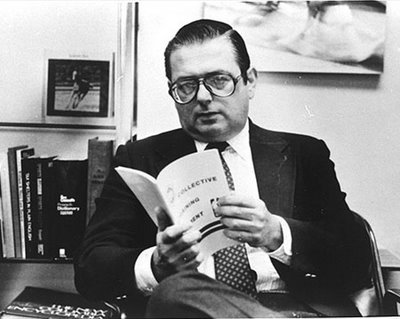The gravitational pull exerted on me by McCann's argument also stems from the fact that I've read David Halberstam's The Breaks of the Game. Specifically, the tale of Larry Fleisher.3

The Fleisher section is where Halberstam lays out the founding of the NBA Player's Association. I have found that Halberstam's version of events appears to include episodes I have not found recorded elsewhere, or at least not on the 'nets. I suppose it's for this lack that I want to get a few of the better parts out there. In direct relation to McCann's article there's this gem.
The owner often quite unconsciously looks down on his players. In part it was a reflection of the fact that the owners thought the athletes were stupid, but it was also a feeling that they should be eternally grateful for the chance to play a little boy's game and be paid for it. With blacks, Fleisher thought, the attitude was far more blatant and nakedly expressed, the racism barely concealed; there are not thousands, but millions out on the playground who want your job, so should be even more grateful.4I consider this the root of seeing things from the owner's perspective. It's important to note the basic prejudice here is that NBA players are athletes, & athletes ("jocks") are stupid. In addition to this there is the "you're getting paid to throw a ball through a hoop" angle, which implies that players should be grateful, & do as they are told.
This second attitude turned out be the very crux upon which the nascent player's union won their first concession. It was the 1964 All-Star break & after 4 years of effort the player's union wasn't getting anywhere. The owners simply weren't listening. However, Fleisher's early strategy had been only to recruit the best players on each team. "They wanted first and foremost the peer respect worthy of a Russell or a Petit or a Wilkens, and secondly they wanted players skilled enough to be immune from front office pressure."5
In '64, NBC was bailing on NBA coverage. ABC decided to do the All-Star game, w/ the tacit understanding that if ratings were good they might pick up the '65 season. In the '60s the NFL was rolling in the cash w/ lucrative teevee contracts, & NBA owners wanted a piece of that action. This placed the players' union in a position of leverage, & they decided to strike - by not reporting to the floor for the All-Star game - demanding only a most-minimum of a pension plan. The owners said no.
The strike was a shaky business; a few minutes before game time it was still uncertain they would go through with it. The breakdown was about eleven to nine in favor and some influential players like Wilt Chamberlain wanted to play now and negotiate later. At that moment Bob Short, one of the owners of the Los Angeles Lakers, sent word down to the locker room that the two Laker All-Stars, Jerry West and Elgin Baylor, better get dressed and get out on the floor immediately or they were gone. It was a grotesque moment and it had a sobering effect on everyone in the locker room: West and Baylor were two of the most respected people in the history of the game. Yet were was an owner treating them as if they were untested rookies, do this, do that, go here, do as I say. The mood in the room swung completely, and solidified behind a strike. ABC meanwhile was squeezing the owners. If the players were not dressed and on the court in twenty minutes, ABC said, there would be no coverage this year or next year. With that the owners folded and promised a pension plan.6Bob Short's command is definitely something I've never found floating about on the 'nets, probably because Halberstam is right in identifying its ugliness. NBPA histories will occasionally mention the threatened strike of the All-Star Game, but will ignore the particulars of what went on in the locker room that day.
-d.d.
* Apologies. I found this lingering in my drafts and figured hell with it let's hit publish.
1 Link broken when Abbott went to ESPN.
2 Link broken when Abbott went to ESPN.
3 Halberstam, David. The Breaks of the Game. Ballatine Books. New York. 1981. p. 341-349.
4 ibid. p. 344.
5 ibid. p. 344-345.
6 ibid. p. 346.

No comments:
Post a Comment